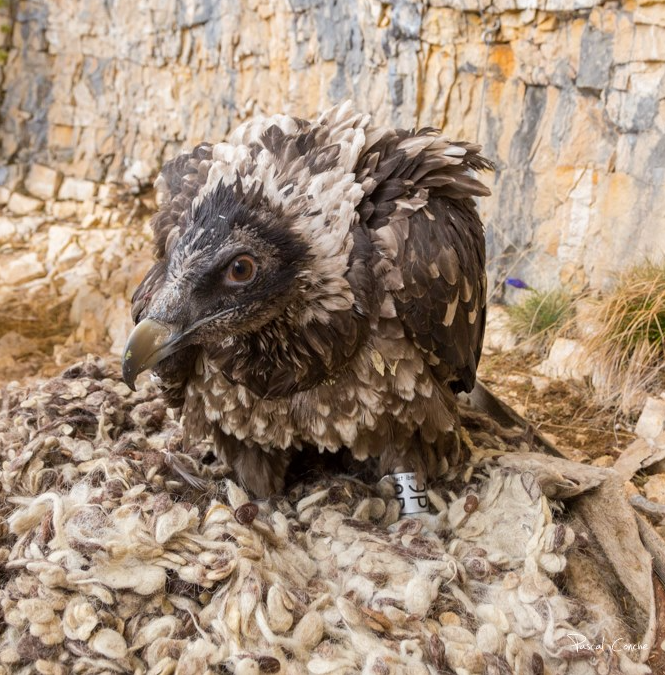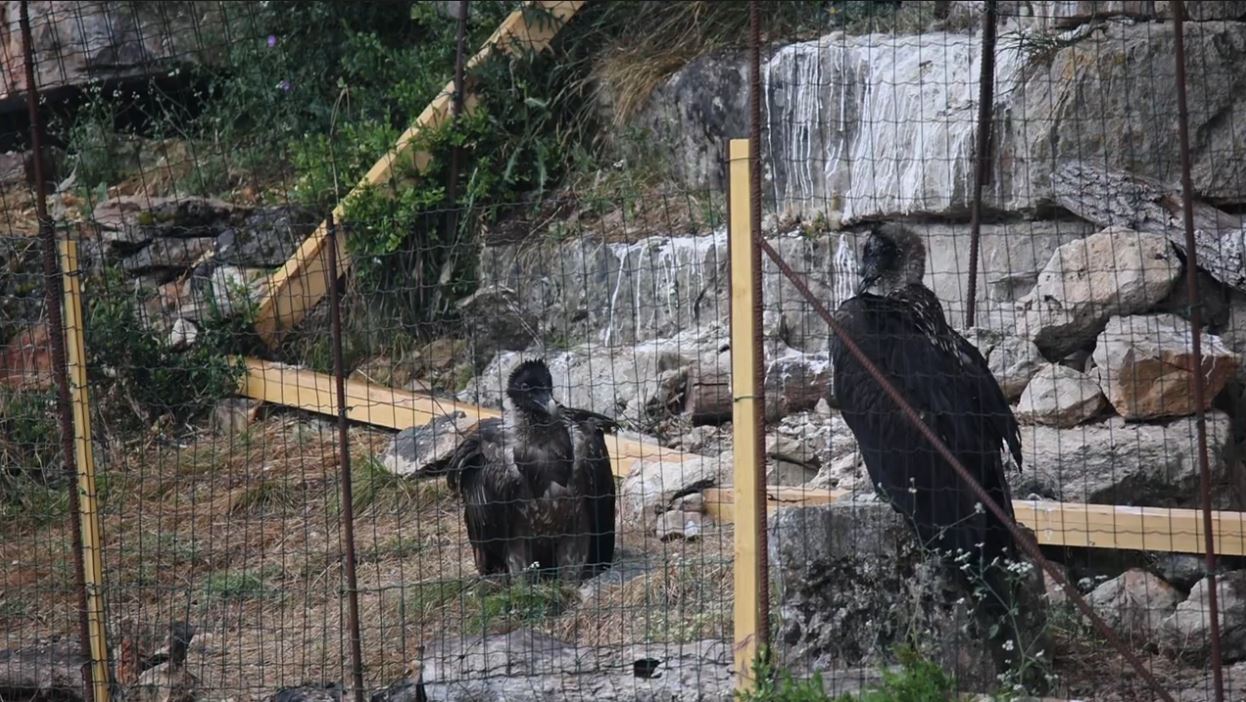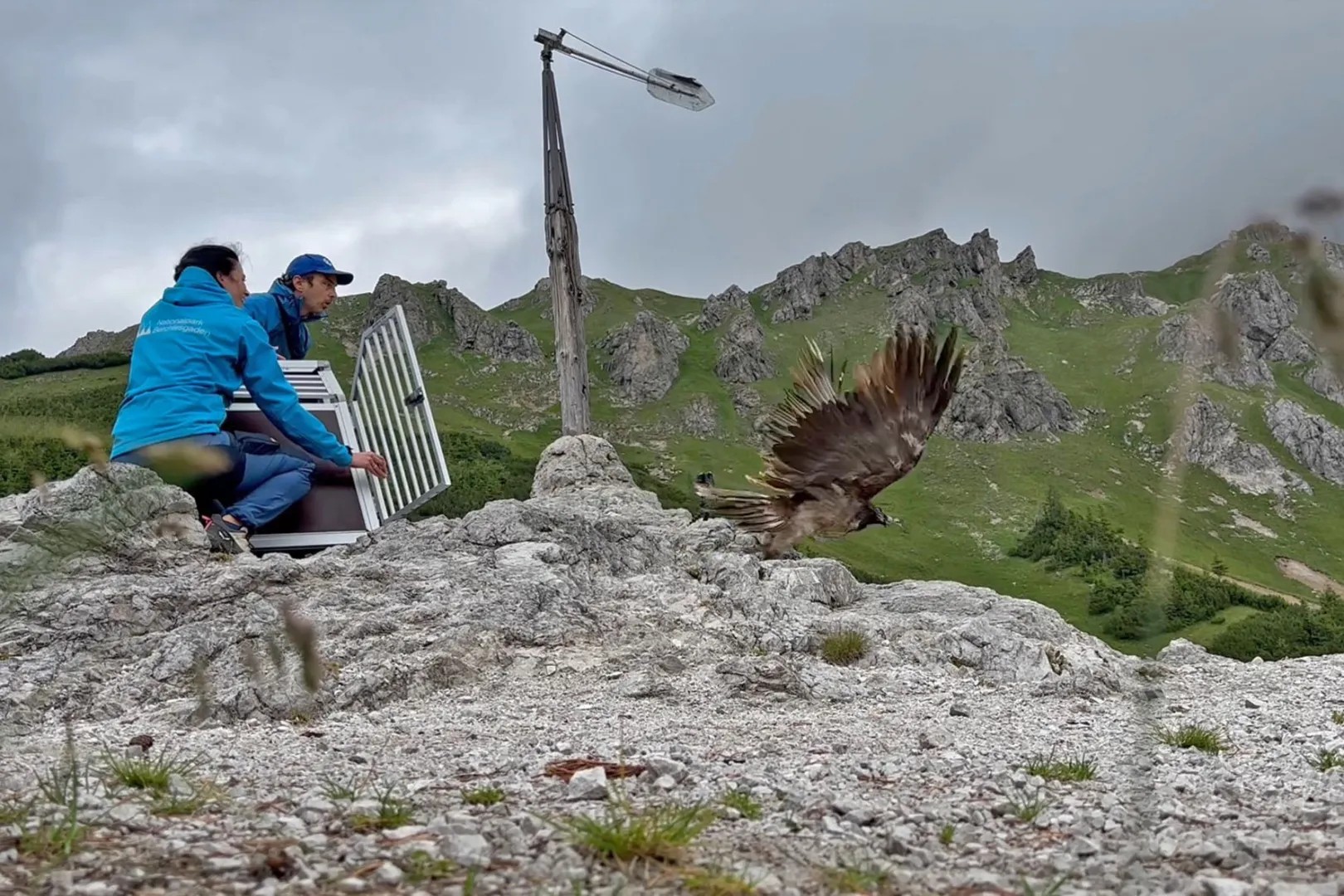
It’s official – 2019 was our best Bearded Vulture Release Season. This year we released a total of 22 Bearded Vultures into the wild, helping boost local populations across France and Spain.
Young Bearded Vultures have travelled right across Europe from zoos and breeding centres to their new homes by car and this year even by plane thanks to the generous support of airline LOT/Nordica.
The success of the 2018/19 breeding season and the dedication of the teams in the zoos and breeding centres to nurture and care for the captive breeding population of birds has resulted in our best Bearded Vulture Release Season to date, helping to strengthen the Bearded Vultures populations in Europe.
Bearded Vulture Release Season

As coordinators of the Bearded Vulture Captive Breeding Network of zoos, specialised breeding centres and private collections we have been working with colleagues from across Europe all year to ensure the best breeding results from the 178 birds within the network. For the past few decades, we have been releasing captive-bred Bearded Vultures into the wild at different locations during the months of May and June.
This year, we planned the release of birds as part of four different projects, in six different locations in France and Spain.
LIFE GYPCONNECT
The LIFE GYPCONNECT project aims to reintroduce a population of Bearded Vultures into the Massif Central mountain range and the French pre-Alps to connect the reintroduced population in the Alps with the population in the Pyrenees.
The release of Europe, Lausa and Monna in the Parc Naturel Régional des Grands Causses on Saturday 6 May kicked off the 2019 Bearded Vulture Release Season. The reintroduction efforts continued with the releases of Mistral and Elvio in Parc Naturel Régional du Vercors on Saturday 18 May, Carmen and Pamela in the Parc Naturel Régional des Baronnies Provençales on Saturday 25 May, and Buisson and Cévennes in the Parc Naturel Régional des Grands Causses on Monday 3 June. The vultures are adapting well in the wild, having their first flights and becoming friends with wild vultures.
The nine birds released (including the two’ surprise releases’) were bred in the specialised breeding centres Valcallent, Guadalentín specialised breeding centres in Spain and the Richard Faust Zentrum centre in Haringsee Austria, the Czech Republic’s Ostrava Zoo and the Green Balkans Wildlife Rehabilitation and Breeding Centre in Bulgaria.
Releasing nine birds in this one year alone brings the total released as part of this conservation project to 27, which is a fantastic outcome!
Andalucía
The releases of birds in Andalucía began with the release of Kika in Parque Natural Sierras de Cazorla on Wednesday 8 May. This was followed with a public presentation of two birds Vanilla and Verdi on Thursday 23 May at Parque Natural Sierra de Castril. The following day on the Friday 24 May two more young birds, Tramaya and Trashumancia, were also released at a release site in Cazorla.
At the site where Kika was released at the beginning of May, Huesitos and Siles were released into the wild on Monday 3 June. The last release of the 2019 Bearded Vulture Release Season took place on Thursday 27 June at Parque Natural Sierras de Cazorla with the release of Arroyo Frio and Stelvio 50.
Together with the Fundación Gypaetus and the Junta de Andalucía, the autonomous regional government, we released a total of nine birds this year into the wild. The birds were bred in the specialised breeding centres Valcallent, Guadalentín specialised breeding centres in Spain and the Richard Faust Zentrum Centre in Austria and at Zoopark Chomutov in the Czech Republic, Tierpark Goldau in Switzerland, Italy’s Parco Natura Viva and Tierpark Berlin in Germany.
Led by the Junta de Andalucía, the Fundación Gypaetus, and us here at the Vulture Conservation Foundation the reintroduction project began in 1996 with the first releases taking place in 2006. With the 2019 releases, a total of 63 Bearded Vultures have been released into the wild.
Maestrazgo
The Maestrazgo region welcomed Basi and Boira, two more Bearded Vulture chicks on Thursday 6 June. Both birds come from the Valcallent and Guadalentín Spanish Specialised Breeding Centres. An official ceremony presented the two vultures to an enthusiastic crowd ahead of their release at Parque Natural de la Tinença de Benifassà. Last year, as part of the project, we released Alòs and Amic, and translocated Esera and Otal from the Pyrenees.
The project to reintroduce the species to the region, led by the Generalitat of Valencia, began in 2018 intending to establish a wild breeding population that will bridge the populations in the Pyrenees and Andalusia.
Corsica
The Vulture Conservation Foundation’s captive-breeding team based at the Valcallent Specialised Breeding Centre, Spain, was back on the island of Corsica this year to release two Bearded Vulture chicks, Cintu and Orba, alongside the Parc Naturel Régional de Corse on Monday 10 June. Cintu and Orba are birds from breeding pairs based at Nuremberg Zoo in Germany and the Richard Faust Zentrum Specialised Breeding Centre in Austria. The collaboration this year has also seen the successful extraction of two eggs from a wild nest that had been consistently unsuccessful and will now build a pool of Corsican birds in our captive breeding network, which will help strengthen the vital population of Bearded Vultures on Corsica. The last time we were on the island was in 2017 when we released two young birds with our Corsican colleagues.
Releasing 22 Bearded Vultures is a momentous task and without the unique collaboration of zoos, breeding, centres and private collections, governmental agencies and non-governmental wildlife organisations, and the dedicated teams involved, it would not have been possible.
Our Director, Dr José Tavares, further adds “The Bearded Vulture restoration programme is truly one of the greatest wildlife comeback stories of our times, and a great European story – these birds are bred and raised in several European countries, and have to travel across some others, to be released into several European mountain chains. A truly collaborative work, that relies on the great work and the commitment of so many partners – thank you to all for making this beautiful story possible!”
We are excited to see what lies ahead for the 22 Bearded Vulture chicks and hope they have a long future in the wild full of exciting adventures!
We want to take this opportunity to thank all our colleagues and partners for helping us achieve this success and a positive future for Bearded Vulture across Europe.




















